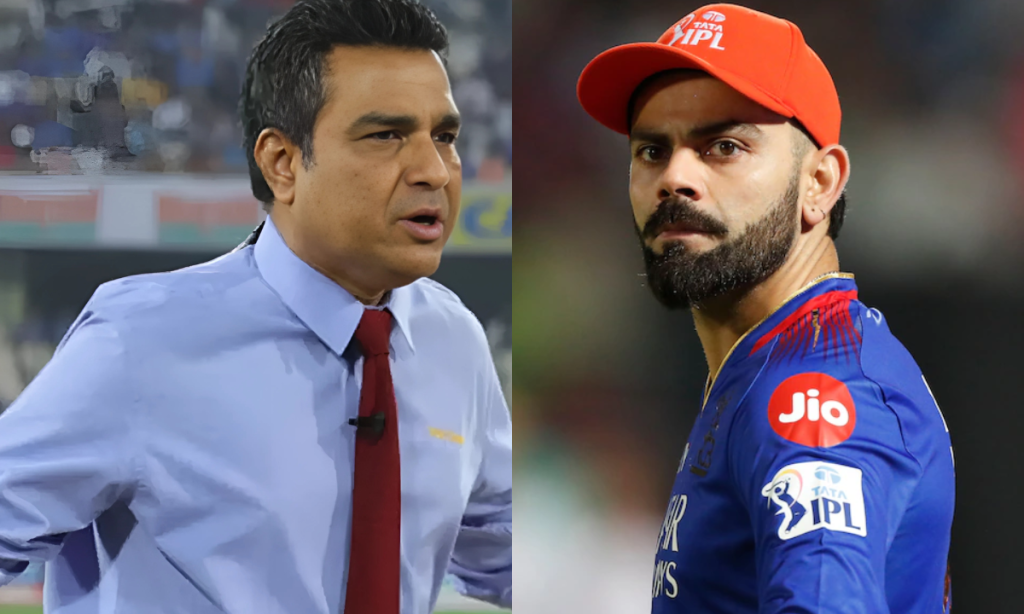Sanjay Manjrekar’s Big Claim On RCB Star: In a cricket world where legends are often measured by their impact in the shortest format of the game, the T20, the comparison between players becomes not just a point of discussion but a celebration of skill, innovation, and adaptability.
The recent bold statement by former Indian cricketer Sanjay Manjrekar about AB de Villiers, one of the most revered players in the Indian Premier League (IPL), has stirred the cricketing community, highlighting the nuances of player utilization within franchise cricket.
The Comparison with Suryakumar Yadav
The Indian Premier League has been a stage where many players have redefined their careers, and the spotlight often falls on those who can innovate and entertain.
The conversation around AB de Villiers and Suryakumar Yadav, both known for their 360-degree playing style, is particularly fascinating.
Manjrekar’s assertion that Suryakumar has surpassed de Villiers in T20 cricket brings to light the evolving nature of the game where new stars can eclipse even the legends of yesteryears.
“I’ll say yes, because of the match-winning impact. AB was incredible. But AB’s greatness was that he averaged 50 in Tests. Even in one day (ODIs). So, he’s an amazing player. But only if you look at T20 cricket; I’ve seen both of them a lot,” Manjrekar explained during a discussion on Star Sports.
This statement underscores a key aspect of cricket analysis – the context in which a player’s performance is evaluated.
While de Villiers has had a stellar career across all formats, Manjrekar’s focus on T20 cricket suggests a shift in how we value players in the modern game, where T20 is not just a format but a spectacle.
The RCB Conundrum for AB de Villiers
Manjrekar’s critique goes beyond mere comparison, delving into how AB de Villiers was managed by the Royal Challengers Bengaluru(RCB).
“AB, in IPL, he was not used properly. His real ability. So, in IPL we didn’t get that much juice out of him. Definitely (batted higher). And, sorry to say, but played for the wrong franchise. If he had played elsewhere, we could have seen the greatness of AB de Villiers,” Manjrekar lamented.
This statement opens a Pandora’s box regarding team strategies in franchise cricket. AB de Villiers, despite being the second-highest run-scorer for RCB with 4491 runs at an average of 41.2 and a strike rate of 158.6, might not have been leveraged to his full potential, according to Manjrekar.
The critique here isn’t about de Villiers’ performance but about the strategic decisions made by the team, which could have potentially maximized his impact.
The essence of Manjrekar’s argument lies in the idea that de Villiers, known for his ability to adapt and innovate, might have been better served in a team environment that allowed him to consistently bat at a position where he could influence the game more decisively from the start or middle overs.
His role at RCB often saw him coming in during the later stages of the innings, which, while still explosive, might not have been the optimal position for showcasing his full range of skills.
The Impact of Franchise Choice
The concept of a player playing for the ‘wrong franchise’ isn’t new but is seldom discussed with such candor.
It raises questions about how much a player’s legacy or perceived greatness can be influenced by the team they represent.
In de Villiers’ case, RCB gave him a platform to become a legend, but Manjrekar suggests there could have been more to his IPL story.
Could a different team with perhaps a different batting order or strategy have seen him win more titles, influence more games, or simply have a greater statistical impact?
The debate also touches on the broader theme of how franchises manage their stars.
In an era where data analytics and player roles are meticulously planned, the placement of a player like de Villiers in the batting order and the strategies employed around his innings could have been pivotal in extracting more ‘juice’ from his talent.
Looking Forward
Manjrekar’s bold claim serves not just as a critique but as a reflection on how cricket has evolved.
It’s a testament to the depth of talent in contemporary cricket where new players like Suryakumar Yadav can be seen as surpassing legends like AB de Villiers in specific aspects of the game.
It also opens up discussions on player psychology, team dynamics, and strategic planning in franchise cricket, which has grown from a mere entertainment spectacle to a serious competitive arena where every player’s utilization is under scrutiny.
As the Indian Premier League continues to evolve, the conversation around players like de Villiers and how teams harness their abilities will only grow.
Manjrekar’s statement, while controversial, invites fans, analysts, and players to look beyond numbers and into the strategic nuances that define cricket at its highest level.
Whether or not de Villiers was indeed with the ‘wrong franchise’ remains a point of debate, but it undeniably adds another layer to the rich tapestry of IPL’s history and its future.

